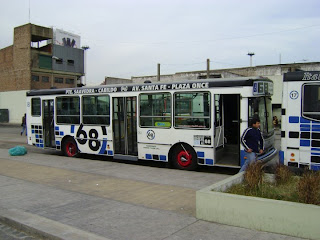Riding the colectivo is a daily part of life in Buenos Aires. Colectivos are what locals call public buses, and during the daytime, they own the streets. It's rare to find one in the morning that isn't packed. And because the subway closes at 11 p.m., colectivos are usually the best option for late-night transportation as well. Buses run 24 hours down here, so even though late at night you might be waiting on a deserted street for 40 minutes, you at least know you're getting home eventually.
Finding the right bus can be a little intimidating at first. Before I became familiar with four or five of the routes that run near my apartment, I would spend upwards of half an hour leafing through the Guia T booklet, attempting in vain to match up streets with bus stops until I gave up and hailed a taxi. Those days are behind me, however; now I just use Google Maps and comoviajo.com to tell me what to do.
When in a foreign part of town for the first time, the first thing I notice are the buses. The kiosks, the buildings, the people, they all might look the same as those in any other neighborhood. But in a new area, the buses -- the ones you've never seen because they don't drive anywhere near your house or your school or your favorite bar -- always stand out. Each one has a unique design, and adds a splash of color to the streets.
With that, I found it appropriate to rate the colectivos. Not by timeliness or efficiency, even though it kills me when I see an uninterrupted line of six 108 buses when all I need is one in the other freaking direction. And not by pleasantness of ride, because that honor would go to any bus outfitted with LCD screens and blue mood lights. Instead, I'll evaluate the colectivos by the first thing one notices about them: their outer design.
The champion
 Línea 68 — If the other buses on this list are rolling pieces of art, then the 68 is a masterpiece. According to Wikipedia, the design is the work of a studio hired by the bus company, and the professionalism shows. Against the white background, the rounded, off-center 68 draws the attention of the viewer, and is accentuated by the disconnected circle surrounding it. The black and soft blue tiles, ostensibly without pattern, give the work a sense of spontaneity. The brilliant use of negative space allows the bold colors to jump out. Even its web site is silky smooth. This is a bus you stop and stare at as it whizzes past you. This is a modern classic.
Línea 68 — If the other buses on this list are rolling pieces of art, then the 68 is a masterpiece. According to Wikipedia, the design is the work of a studio hired by the bus company, and the professionalism shows. Against the white background, the rounded, off-center 68 draws the attention of the viewer, and is accentuated by the disconnected circle surrounding it. The black and soft blue tiles, ostensibly without pattern, give the work a sense of spontaneity. The brilliant use of negative space allows the bold colors to jump out. Even its web site is silky smooth. This is a bus you stop and stare at as it whizzes past you. This is a modern classic.